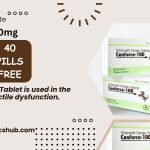When it comes to men’s health, few topics are as vital or as widely discussed as erectile function. Maintaining optimal performance in the bedroom is not only crucial for intimate relationships but also for overall well-being and self-confidence. While numerous factors can impact erectile function, including lifestyle habits, one area that often gets overlooked is diet. What we consume plays a significant role in our body’s ability to perform, and certain foods can either support or hinder erectile function. In this article, we’ll explore five foods that men should avoid to promote better erectile function.
Processed Foods
Processed foods have become a staple in many diets due to their convenience and long shelf life. However, they are often laden with artificial ingredients, preservatives, high levels of sodium, and unhealthy fats, all of which can negatively affect erectile function. Diets high in processed foods have been linked to obesity, high blood pressure, and heart disease, all of which are risk factors for erectile dysfunction. To support better erectile function, it’s essential to minimize or eliminate processed foods from your diet and opt for whole, nutrient-dense alternatives instead.
Sugary Treats
Excessive consumption of sugar and sugary treats can wreak havoc on your body’s metabolic health, leading to a host of issues, including insulin resistance, weight gain, and inflammation. These factors can contribute to poor circulation, nerve damage, and vascular problems, all of which can impair erectile function. To maintain optimal erectile health, it’s crucial to limit your intake of sugary foods and beverages, including sodas, candies, pastries, and desserts. Instead, opt for natural sweeteners like stevia or monk fruit, and satisfy your sweet tooth with whole fruits or dark chocolate in moderation.
High-Sodium Foods
Diets high in sodium can contribute to hypertension and vascular dysfunction, both of which are closely linked to erectile dysfunction. High-sodium foods, such as processed meats, canned soups, salty snacks, and fast food, can lead to water retention and increased blood pressure, which can impair blood flow to the penis. To support better erectile function, it’s essential to limit your intake of high-sodium foods and focus on incorporating fresh vegetables, fruits, lean proteins, and whole grains into your diet. Additionally, be mindful of portion sizes and opt for low-sodium or no-sodium-added alternatives when possible.
Alcohol
While the occasional drink may not have a significant impact on erectile function, excessive or chronic alcohol consumption can take a toll on your sexual health. Alcohol is a depressant that can dampen sexual arousal and impair nervous system function, making it more difficult to achieve and maintain an erection. Furthermore, alcohol can contribute to weight gain, hormonal imbalances, and liver damage, all of which can contribute to erectile dysfunction over time. To support better erectile function, it’s essential to consume alcohol in moderation and be mindful of its effects on your body and sexual performance.
Trans Fats
Trans fats are a type of unsaturated fat that are commonly found in processed and fried foods. These fats can raise bad cholesterol levels and increase your risk of heart disease, stroke, and type 2 diabetes, all of which are risk factors for erectile dysfunction. To promote better erectile function, it’s crucial to avoid trans fats and opt for healthier fat sources such as avocados, nuts, seeds, and olive oil. Reading food labels carefully and choosing products that are labeled trans fat-free can help you make healthier choices for your heart and sexual health.
In conclusion, making dietary changes can have a significant impact on erectile function and overall sexual health. By avoiding processed foods, sugary treats, high-sodium foods, alcohol, and trans fats, you can support better blood flow, hormone balance, and nervous system function, all of which are essential for optimal sexual performance. Remember to prioritize whole, nutrient-dense foods and stay hydrated to support your body’s natural processes. Additionally, incorporating regular exercise and stress management techniques can further enhance your sexual health and well-being.











